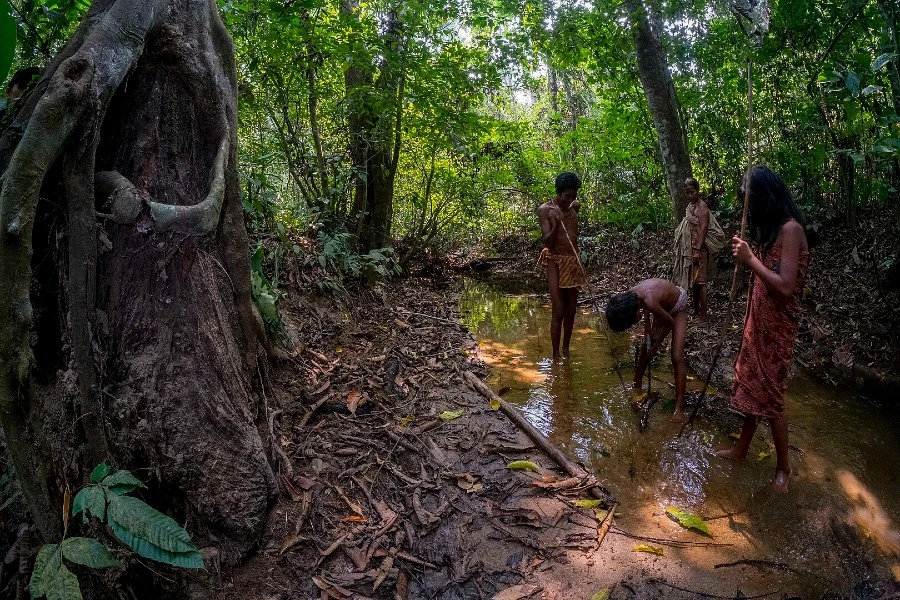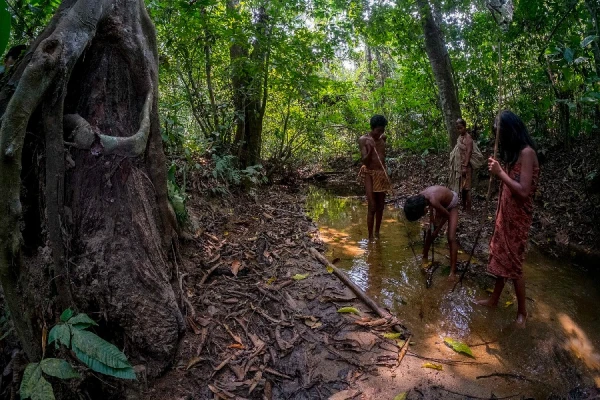Farewell to Elementary School Friends
Perhaps it was God’s destiny that I had to follow my parents to a transmigration area in Bangko, Jambi. At first, I didn’t want to go—I was used to the cool mountain town life in Boyolali and had just graduated from elementary school, accepted at SMPN 1 Boyolali.
Only one day was left before the farewell event, where parents were invited to witness a school performance. But I was still anxious because my mother, youngest sibling, and father had left a month earlier to the transmigration area. Meanwhile, my siblings and I stayed at a military dormitory behind the Court Office. The dorm was larger and inhabited only by my family. The building retained its Dutch colonial style after moving from a barracks on Melati Street (which I mentioned in a previous story).
My mind was troubled and sad, as my parents had not informed when they would pick me up. Back then, mail took a very long time by post. Suddenly, my grandmother called my name—my mother had come from Bangko, Jambi, around 4 p.m., carrying my two-year-old youngest sibling (whenever I write about my youngest sibling, tears well up since he passed away in October 2024 after illness, following our parents).
I was both sad and happy because God answered my prayers—my mother came to see me at school. Sadly, my father could not come yet, according to my mother. He would pick me up later. When the rankings were announced, my name was called. I ranked third, and even though I was behind very smart classmates, I was grateful.
Farewell to Middle School Friends
After the elementary school farewell, I began attending SMPN 1 Boyolali, a highly selective and prestigious school. I registered alone because my parents were still in Bangko, Jambi. This situation forced me to be independent, alongside my father’s military discipline—no crying and always self-reliant.
After just three months there, I had to move to the transmigration area. Many assume transmigrants come from poverty, but my father had a different vision—he wanted a secure future and success for his six children. Income from the military was insufficient as he neared retirement. Hence, my parents sought land ownership for the long term. Coincidentally, my father was appointed head of the transmigration group from Kodam Diponegoro.
I was still studying when my father came to school to handle my transfer paperwork. I felt sad, disappointed, and frustrated. The four of us siblings had to move with him, imagining the new place would be hot, with unfamiliar friends and limited facilities compared to the city.
The Long, Exhausting Journey
My mother busily prepared our belongings for the move. Imagine relocating four children to a transmigration area—very complicated. Meanwhile, my two other siblings remained as they had to finish high school. The eldest was in grade 3, the other in grade 1 at a special school dorm. Fortunately, they were allowed to stay in dorms with support from my father’s military commander.
My mother advised me to take anti-motion sickness medicine for the long journey. Back then, the Sumatra highway was rough—full of potholes and dirt stretches. The journey took three days and two nights. Without air conditioning, the bus was hot, and I wore a sullen expression. Passing through Lahat, the worst part with winding roads, I got motion sickness. Lahat was also notorious for "Jumping Squirrels", highway robbers who plundered passengers’ belongings.
Arrival in Margoyoso, Bangko, Jambi
After the long trip, I finally arrived at the ALS bus terminal in Margoyoso. I thought I had reached the transmigration site, but there was still another two-hour journey ahead. Exhausted, disheveled, and sleepy, I arrived around 6 p.m.
Getting off the bus meant transferring to an open pickup truck only covered on top—a first-time experience for me.
First Meeting with the Anak Dalam Tribe at Margoyoso
I was startled and scared when I saw the Kubu tribe. They lived primitively—women wore just a simple cloth and sarong to cover themselves, while men covered their private parts with a small piece of cloth. Previously, I had only read about Indonesia’s tribes like the Dayak, Bugis, or Toraja, which are widely known. To see the Kubu tribe up close was shocking.
They approached us asking for money. My father was curious why they gathered at the bus terminal. According to agents’ stories, a Kubu member had been struck by a Sumatra bus, leading to a protest at the bus agent. They came in groups, and to me, it was terrifying—they carried spears, machetes, and arrows.
Life in the Transmigration Area
After a two-hour journey, I reached a simple government-assigned house with a tin roof, wooden walls, and dirt floors. My parents comforted me as I cried and was angry. I was disappointed and immature then—life without electricity, relying on kerosene lamps at night.
There was no market or school yet, truly isolated. I could not attend school immediately as there were no teachers.
Father Established a School after Being Rejected at Rantau Panjang
Appointed by the government as village head over about 600 families, my father led the progress. The village had a school building with an auditorium, classrooms, and even a basketball court. The junior high school hadn’t opened yet due to teacher shortages.
After a week’s rest, my father went to Rantau Panjang to register me and my sister for junior high. Despite it being a bustling district, the headmaster rejected us. Hearing this, I was devastated and nearly depressed. My father was angry and disappointed. For about a month, I was out of school. Attending school in Rantau Panjang meant renting lodging, which was costly. I admired my father’s determination as village chief who didn’t want us or the children to drop out, especially since many local youths married young.
Government Support to Build a School
Refusing to fall behind, my father applied for permission to build a school. The government responded generously—deliveries from the central education office included a complete gamelan set, textbooks, and sports equipment. Teachers were volunteers—friends of my father from the military and their educated relatives from Java.
Visiting the Anak Dalam Settlement at Bukit 12 Accompanied by Father for a Governor's Visit
Slowly I accepted my life as a soldier’s child, placed anywhere in good or bad times. I started studying despite limited resources and growing accustomed to walking a kilometer to school through muddy, sometimes scorching paths after forest clearing. Returning home, we crossed a river to swim with friends still in uniforms—unforgettable memories.
Before returning from school, my teacher informed us about a planned visit by the Governor to Bukit 12 Anak Dalam village. Volunteers were offered an open-bed truck to travel the difficult two-hour road to the remote area. My father, as village chief, rode upfront with friends; my friends and I sat at the back on tarps—no complaints, I was eager to see the tribe’s settlement.
Bukit 12 Anak Dalam Village
Located on the border between Sarolangun and Tebo, the scenery was stunning with rolling hills and a protected nature reserve. Environmental researchers from international bodies also came to study.
No mobile phones then, and film was hard to find locally, so no photos. The anak Dalam homes were simple stilt houses built by the government but poorly maintained as the tribe practiced a nomadic lifestyle. Elders told us of customs such as not spitting when meeting them: it is believed you would follow the tribe wherever they go.
I felt moved and saddened by their backwardness—they viewed outsiders as invaders. Initially scared upon encounters, I grew used to them. My father advised me on taboos to avoid upsetting the tribe.
The Governor’s Arrival by Helicopter at Bukit 12
My father occupied a simple seat among guests. Gathering the Anak Dalam was difficult. When the helicopter landed and the governor greeted them, the tribe asked for cigarettes before joining the gathering. They seemed more fascinated by the helicopter, touching it as if marveling at a flying object—probably their first encounter with such technology.
Discussions about managing the tribe and livelihood guidance had been given, but change wasn’t easy. The tribe relied on hunting and fishing for survival. If a relative got sick, they would just move on. They lived nomadically with their own social rules—marriage within groups was freely practiced.
Despite their primitiveness, they had remarkable resilience—self-delivering babies and making their own medicines during postpartum without medical help. After the visit, we returned home with durians—the local fruit in season—affordable and plentiful.
Visit from the Tribe’s Chief to Our Home
My friends often asked if I had met the tribe’s Datuk (chief). Their stories described him as walking backward with unusual footprints. I was skeptical until a tall, broad-shouldered man carrying a staff and wearing a long necklace appeared at our home one evening looking for my father.
I was initially fearful but curious if my father had broken tribal rules. The man came with an offer to sell rare Jelutung wood, valuable per cubic meter. His sturdy build, staff, and tooth-shaped pendant marked him as a leader they called "Pasirah" (chief).
His leadership was admirable—they fiercely defended their people against oppression regardless of legal risks. They retaliated strongly if any member was harmed.
Signs of Change
Over time, our village progressed. Once dense forests now hosted palm oil plantation companies leasing our lands. This affected the Anak Dalam community—they initially feared we were invaders taking their forest survival grounds. But there were positive impacts too.
They moved beyond pure hunting and fishing, adapting to rice, cooking utensils, and spices. By the 1990s, some cooked rice in pots, wore regular clothes while a few still used traditional coverings. We didn’t force, but gently persuaded.
The Anak Dalam Tribe in the 2000s
With modernization, NGOs and the government promoted literacy among the Anak Dalam, although progress was slow. Their population grew, and technology intrigued them. By 2006, many wore modern clothes and makeup, sometimes hilariously. At markets I teased young tribe members about lipstick and hair extensions—they laughed rather than got angry.
They earned money from selling wild boar. I advised buying gold at the market from gains.
Preparing Eid Delicacies for the Anak Dalam
Not only locals visit each other during Eid. Some tribe members went door-to-door seeking treats. They mostly disliked eggs, so we gave foods without eggs. I don’t know if they understood the meaning of Eid.
Many Anak Dalam embraced modern life—some studied, joined the military, became palm oil entrepreneurs, or fish farmers. Meanwhile, our village advanced: my father founded private senior and junior high schools, which later became public; now there are schools from elementary to vocational accommodating ten transmigrant communities. Our children even pursue higher education supported by the palm oil economy.
Lessons from Living in the Forest and Meeting the Anak Dalam
Though mocked as "transmigration kids," we proved ourselves academically. After completing junior high in 1986, our area had no senior high school until my father launched a private one. I entered SMAN 1 Bangko after passing selection exams and boarded there due to distance.
I admire my father’s hard work and social spirit—recognized as an exemplary village chief representing Jambi province and even honored by the president. Despite living in remote areas, we never lost spirit. His efforts enabled his children’s education to university level. My eldest sibling was the first from transmigration areas to enter the military academy. My father passed in 2011; my sisters continued building the community as teachers and cooperative leaders, even winning national awards.
Farewell to Elementary School Friends
Perhaps it was God’s destiny that I had to follow my parents to a transmigration area in Bangko, Jambi. At first, I didn’t want to go—I was used to the cool mountain town life in Boyolali and had just graduated from elementary school, accepted at SMPN 1 Boyolali.
Only one day was left before the farewell event, where parents were invited to witness a school performance. But I was still anxious because my mother, youngest sibling, and father had left a month earlier to the transmigration area. Meanwhile, my siblings and I stayed at a military dormitory behind the Court Office. The dorm was larger and inhabited only by my family. The building retained its Dutch colonial style after moving from a barracks on Melati Street (which I mentioned in a previous story).
My mind was troubled and sad, as my parents had not informed when they would pick me up. Back then, mail took a very long time by post. Suddenly, my grandmother called my name—my mother had come from Bangko, Jambi, around 4 p.m., carrying my two-year-old youngest sibling (whenever I write about my youngest sibling, tears well up since he passed away in October 2024 after illness, following our parents).
I was both sad and happy because God answered my prayers—my mother came to see me at school. Sadly, my father could not come yet, according to my mother. He would pick me up later. When the rankings were announced, my name was called. I ranked third, and even though I was behind very smart classmates, I was grateful.
Farewell to Middle School Friends
After the elementary school farewell, I began attending SMPN 1 Boyolali, a highly selective and prestigious school. I registered alone because my parents were still in Bangko, Jambi. This situation forced me to be independent, alongside my father’s military discipline—no crying and always self-reliant.
After just three months there, I had to move to the transmigration area. Many assume transmigrants come from poverty, but my father had a different vision—he wanted a secure future and success for his six children. Income from the military was insufficient as he neared retirement. Hence, my parents sought land ownership for the long term. Coincidentally, my father was appointed head of the transmigration group from Kodam Diponegoro.
I was still studying when my father came to school to handle my transfer paperwork. I felt sad, disappointed, and frustrated. The four of us siblings had to move with him, imagining the new place would be hot, with unfamiliar friends and limited facilities compared to the city.
The Long, Exhausting Journey
My mother busily prepared our belongings for the move. Imagine relocating four children to a transmigration area—very complicated. Meanwhile, my two other siblings remained as they had to finish high school. The eldest was in grade 3, the other in grade 1 at a special school dorm. Fortunately, they were allowed to stay in dorms with support from my father’s military commander.
My mother advised me to take anti-motion sickness medicine for the long journey. Back then, the Sumatra highway was rough—full of potholes and dirt stretches. The journey took three days and two nights. Without air conditioning, the bus was hot, and I wore a sullen expression. Passing through Lahat, the worst part with winding roads, I got motion sickness. Lahat was also notorious for "Jumping Squirrels", highway robbers who plundered passengers’ belongings.
Arrival in Margoyoso, Bangko, Jambi
After the long trip, I finally arrived at the ALS bus terminal in Margoyoso. I thought I had reached the transmigration site, but there was still another two-hour journey ahead. Exhausted, disheveled, and sleepy, I arrived around 6 p.m.
Getting off the bus meant transferring to an open pickup truck only covered on top—a first-time experience for me.
First Meeting with the Anak Dalam Tribe at Margoyoso
I was startled and scared when I saw the Kubu tribe. They lived primitively—women wore just a simple cloth and sarong to cover themselves, while men covered their private parts with a small piece of cloth. Previously, I had only read about Indonesia’s tribes like the Dayak, Bugis, or Toraja, which are widely known. To see the Kubu tribe up close was shocking.
They approached us asking for money. My father was curious why they gathered at the bus terminal. According to agents’ stories, a Kubu member had been struck by a Sumatra bus, leading to a protest at the bus agent. They came in groups, and to me, it was terrifying—they carried spears, machetes, and arrows.
Life in the Transmigration Area
After a two-hour journey, I reached a simple government-assigned house with a tin roof, wooden walls, and dirt floors. My parents comforted me as I cried and was angry. I was disappointed and immature then—life without electricity, relying on kerosene lamps at night.
There was no market or school yet, truly isolated. I could not attend school immediately as there were no teachers.
Father Established a School after Being Rejected at Rantau Panjang
Appointed by the government as village head over about 600 families, my father led the progress. The village had a school building with an auditorium, classrooms, and even a basketball court. The junior high school hadn’t opened yet due to teacher shortages.
After a week’s rest, my father went to Rantau Panjang to register me and my sister for junior high. Despite it being a bustling district, the headmaster rejected us. Hearing this, I was devastated and nearly depressed. My father was angry and disappointed. For about a month, I was out of school. Attending school in Rantau Panjang meant renting lodging, which was costly. I admired my father’s determination as village chief who didn’t want us or the children to drop out, especially since many local youths married young.
Government Support to Build a School
Refusing to fall behind, my father applied for permission to build a school. The government responded generously—deliveries from the central education office included a complete gamelan set, textbooks, and sports equipment. Teachers were volunteers—friends of my father from the military and their educated relatives from Java.
Visiting the Anak Dalam Settlement at Bukit 12 Accompanied by Father for a Governor's Visit
Slowly I accepted my life as a soldier’s child, placed anywhere in good or bad times. I started studying despite limited resources and growing accustomed to walking a kilometer to school through muddy, sometimes scorching paths after forest clearing. Returning home, we crossed a river to swim with friends still in uniforms—unforgettable memories.
Before returning from school, my teacher informed us about a planned visit by the Governor to Bukit 12 Anak Dalam village. Volunteers were offered an open-bed truck to travel the difficult two-hour road to the remote area. My father, as village chief, rode upfront with friends; my friends and I sat at the back on tarps—no complaints, I was eager to see the tribe’s settlement.
Bukit 12 Anak Dalam Village
Located on the border between Sarolangun and Tebo, the scenery was stunning with rolling hills and a protected nature reserve. Environmental researchers from international bodies also came to study.
No mobile phones then, and film was hard to find locally, so no photos. The anak Dalam homes were simple stilt houses built by the government but poorly maintained as the tribe practiced a nomadic lifestyle. Elders told us of customs such as not spitting when meeting them: it is believed you would follow the tribe wherever they go.
I felt moved and saddened by their backwardness—they viewed outsiders as invaders. Initially scared upon encounters, I grew used to them. My father advised me on taboos to avoid upsetting the tribe.
The Governor’s Arrival by Helicopter at Bukit 12
My father occupied a simple seat among guests. Gathering the Anak Dalam was difficult. When the helicopter landed and the governor greeted them, the tribe asked for cigarettes before joining the gathering. They seemed more fascinated by the helicopter, touching it as if marveling at a flying object—probably their first encounter with such technology.
Discussions about managing the tribe and livelihood guidance had been given, but change wasn’t easy. The tribe relied on hunting and fishing for survival. If a relative got sick, they would just move on. They lived nomadically with their own social rules—marriage within groups was freely practiced.
Despite their primitiveness, they had remarkable resilience—self-delivering babies and making their own medicines during postpartum without medical help. After the visit, we returned home with durians—the local fruit in season—affordable and plentiful.
Visit from the Tribe’s Chief to Our Home
My friends often asked if I had met the tribe’s Datuk (chief). Their stories described him as walking backward with unusual footprints. I was skeptical until a tall, broad-shouldered man carrying a staff and wearing a long necklace appeared at our home one evening looking for my father.
I was initially fearful but curious if my father had broken tribal rules. The man came with an offer to sell rare Jelutung wood, valuable per cubic meter. His sturdy build, staff, and tooth-shaped pendant marked him as a leader they called "Pasirah" (chief).
His leadership was admirable—they fiercely defended their people against oppression regardless of legal risks. They retaliated strongly if any member was harmed.
Signs of Change
Over time, our village progressed. Once dense forests now hosted palm oil plantation companies leasing our lands. This affected the Anak Dalam community—they initially feared we were invaders taking their forest survival grounds. But there were positive impacts too.
They moved beyond pure hunting and fishing, adapting to rice, cooking utensils, and spices. By the 1990s, some cooked rice in pots, wore regular clothes while a few still used traditional coverings. We didn’t force, but gently persuaded.
The Anak Dalam Tribe in the 2000s
With modernization, NGOs and the government promoted literacy among the Anak Dalam, although progress was slow. Their population grew, and technology intrigued them. By 2006, many wore modern clothes and makeup, sometimes hilariously. At markets I teased young tribe members about lipstick and hair extensions—they laughed rather than got angry.
They earned money from selling wild boar. I advised buying gold at the market from gains.
Preparing Eid Delicacies for the Anak Dalam
Not only locals visit each other during Eid. Some tribe members went door-to-door seeking treats. They mostly disliked eggs, so we gave foods without eggs. I don’t know if they understood the meaning of Eid.
Many Anak Dalam embraced modern life—some studied, joined the military, became palm oil entrepreneurs, or fish farmers. Meanwhile, our village advanced: my father founded private senior and junior high schools, which later became public; now there are schools from elementary to vocational accommodating ten transmigrant communities. Our children even pursue higher education supported by the palm oil economy.
Lessons from Living in the Forest and Meeting the Anak Dalam
Though mocked as "transmigration kids," we proved ourselves academically. After completing junior high in 1986, our area had no senior high school until my father launched a private one. I entered SMAN 1 Bangko after passing selection exams and boarded there due to distance.
I admire my father’s hard work and social spirit—recognized as an exemplary village chief representing Jambi province and even honored by the president. Despite living in remote areas, we never lost spirit. His efforts enabled his children’s education to university level. My eldest sibling was the first from transmigration areas to enter the military academy. My father passed in 2011; my sisters continued building the community as teachers and cooperative leaders, even winning national awards.
Conclusion
Lorem ipsum dolor sit amet, consectetur adipiscing elit, sed do eiusmod tempor incididunt ut labore et dolore magna aliqua. Ut enim ad minim veniam, quis nostrud exercitation ullamco laboris nisi ut aliquip ex ea commodo consequat. Duis aute irure dolor in reprehenderit in voluptate velit esse cillum dolore eu fugiat nulla pariatur. Excepteur sint occaecat cupidatat non proident, sunt in culpa qui officia deserunt mollit anim id est laborum.
Closing
Thank you, Anak Dalam Tribe, for motivating me when I almost lost hope living in the forest’s remote areas. You maintain gratitude toward God’s destiny as the Anak Dalam. It is our duty to preserve you and prevent your culture and people from extinction. To readers of this story, let us pray for our brothers and sisters in the Anak Dalam to adapt through time without being forced. Apologies for any improper words or tone in my narration.
Respectfully, the author.








Responses